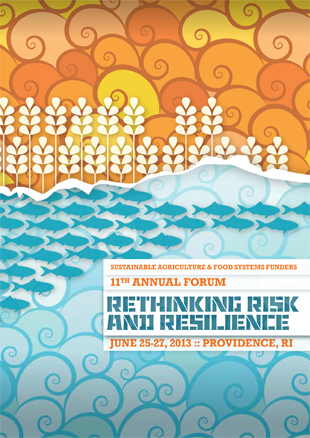HEFN Program Manager Ramtin Arablouei wrote this blog post.
People care about what they eat. The table topped with a meal is where we share stories, learn, and bond. It is sometimes the first example of community any of us experience. In recent years, many Americans have woken up to the fact that our food system has developed into something that often weakens our health and communities instead of strengthening them.
The 2013 Sustainable Agriculture and Food Systems Funders (SAFSF) Annual Forum gathered over 160 funders from across the country to explore new possibilities for promoting better agriculture and food. The forum’s theme—rethinking risk & resilience—provided a frame for community-focused discussions. As an opening plenary speaker described, “resilience is a community able to protect and preserve its health, environment, and identity.” I joined funders at SAFSF’s meeting in Rhode Island to explore that idea and will share some of the most relevant highlights here.
Movement Building
In several sessions, funders discussed broadening the good food movement to include other major social justice issues. This is a dilemma that many funder groups are dealing with. How do we break out of our silos and create a bigger, better movement that can take on the huge obstacles that no one movement can take on itself? Food is important for everyone and could be at the heart of a movement towards a healthier, cleaner, and more just society.
Environment
Poor agricultural practices have often been associated with climate change. Research has indicated that stripping land of trees, the use of toxic pesticides, and waste produced by industrial farms are impacting water and air quality. During each session speakers reminded us that, at its core, the food movement is an environmental movement. The food that comes from our farms can either be a sign of a healthy relationship with our environment or the source of many of our environmental problems.
Health
Several speakers mentioned the importance of health in the argument for improving food systems. The obesity epidemic and the growing awareness of toxic chemicals have pushed food into the national discourse. The impact of food on our health has helped motivate people to buy more fresh and local produce as a way to keep their families safe and healthy.
Funders at the “Don’t Frack Our Fields: Protecting Farmland and the Rural Landscape from Oil and Gas Development” workshop
Fracking
HEFN members, the Claneil Foundation and 11th Hour Project, sponsored a session on the threats of hydraulic fracturing to farms and food systems. At its core, this session was about farmers defending the health of their land and communities. We heard from several organizers and farmers from Pennsylvania who are experiencing the impacts of fracking on a daily basis. They reminded us that food quality may be compromised by fracking impacts in communities near and far, a striking reminder that extreme energy extraction could make its way to all of our dinner tables.
As an overall takeaway, I found Rhode Island to be a special place. The tiniest state in the country has one of the most robust and well-coordinated local food movements in the country. From the urban streets of Providence to the farms in the south of the state, something special is happening in Rhode Island. Farmers, activists, and advocates are cooperating to find a healthier way to live and to eat. Maybe this is why Providence is routinely called the best food city in America. Maybe this is why there could have been no better place for funders to explore the question of resilience in our food system.
The 2013 SAFSF meeting was inspiring and affirming. The task before funders focused on food systems and agriculture is immense. Many questions remained unanswered. How can funders continue to support organizations making connections across issue areas? How can the movement better connect with our healthcare system, environmental protections, and energy production? These questions provide a canvas for an ongoing discussion happening within philanthropy. With a funding community like SAFSF leading the way it reminds us that a new world is possible.

